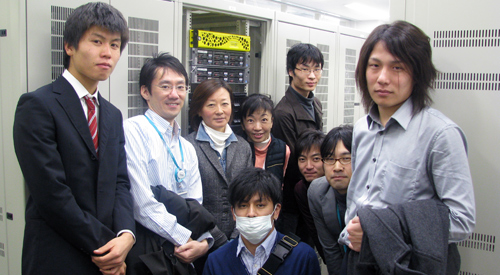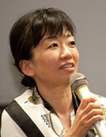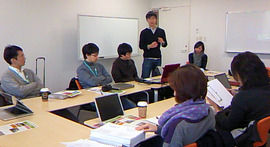Information Systems Perspective Investigation and Requirement Engineering Lab

Snapshot after workshop
The INSPIRE Lab was established to conduct multifaceted research on information systems, looking not just at software engineering but also at the hardware aspects and how systems are used. It is led by Special Research Associate Professor Keiko Shimazu, Professor Taketoshi Hibiya, and Professor Kenichi Takano. Four students from the laboratory presented at the national conference of the Information Systems Society of Japan in November 2010, and their papers were well received. Researchers from the laboratory are also scheduled to present on the progress and results of their research at the national conference of the Information Processing Society of Japan scheduled for March 2011.
The INSPIRE Lab holds an alternating series of workshops and seminars every two weeks.
- Official site (Japanese):
https://sites.google.com/site/keioinspirelab/
Model driven requirements development
Research in this field aims to develop techniques and technologies to bring to information systems the same framework for safe, stable systems engineering that has been established in the course of large-scale, complex systems development projects. Research into information systems has traditionally taken software engineering or computer science as its basis, but our focus in this laboratory is on the use and operation of information systems, and our goal is optimized design. The requirements development process, in particular, has relied on intuition and experience, but we are trying to develop a more systematic framework. Of particular interest are efficient CONOPS creation and requirements definition and the application of traceability to systems requirements, system architecture, and validation and verification tests.
We also look at increasingly complex systems architecture. The involvement of more stakeholders in information systems has resulted in the need for multiple points of view in system architecture, and research in this area attempts to satisfy requirements in a way that is optimized to resolve conflicting viewpoints. One of our projects is the development of a framework that allows for coherent architecture among differing viewpoints. To do this, we apply a theoretical mathematical concept known as a "consistency constraint algorithm."
Information architecture and information system architecture
Information systems have become an indispensable tool for industry, but in most cases they are extensions of existing systems or integrations of multiple systems. Research into information systems has traditionally taken the perspective of software engineering or computer science, but there has been little done on extensibility and integration. The INSPIRE Lab looks at this problem in terms of the optimization of information architecture, or how to support the optimization of information system design after extension and integration. Information architecture was developed in Europe as a methodology to take mere data and share it as something valuable. Our goal is to extend these concepts to the design of information systems.
Human error and information system problems
In Japan, the IT industry is touted as being the new 3K (from the words kitsui, kitanai and kiken: demanding, dirty, and dangerous) and has difficulties in recruiting and training talented personnel. The INSPIRE Lab uses member aptitude testing, quantification of individual mission objectives, and coaching as strategies to reduce system failures due to human error.
Applying results to real-world systems
The INSPIRE Lab emphasizes "real world oriented" research. We want our theoretical and experimental results to contribute to the development of actual information systems.
To date, three of our projects have made it into real systems.
・Semantic search engines
・Laboratory automation
・Integrated query system for cultural artifact archives
Competitive funding awarded to members
Scientific Research Subsidy basic research (C)
Scientific Research Subsidy basic research (B)
Japan Science and Technology Agency Advanced Measurement and Analysis Technology Development Project

Special Research Associate Professor Keiko Shimazu
Worked in the Information System Division and IT Media Research Center of Fuji Xerox Co., Ltd. and as an associate professor at the Research Institute for Digital Media and Content, Keio University before being appointed to current position.
Area of expertise: Information system engineering, applications engineering

Professor Taketoshi Hibiya
Worked as Professor of system design at Tokyo Metropolitan University before being appointed to current position.
Areas of expertise: System design in large-scale scientific research

Professor Kenichi Takano
Worked as a senior researcher at the Central Research Institute of Electric Power Industry before being appointed to current position.
Areas of expertise: Risk management and human factors in large technology systems



